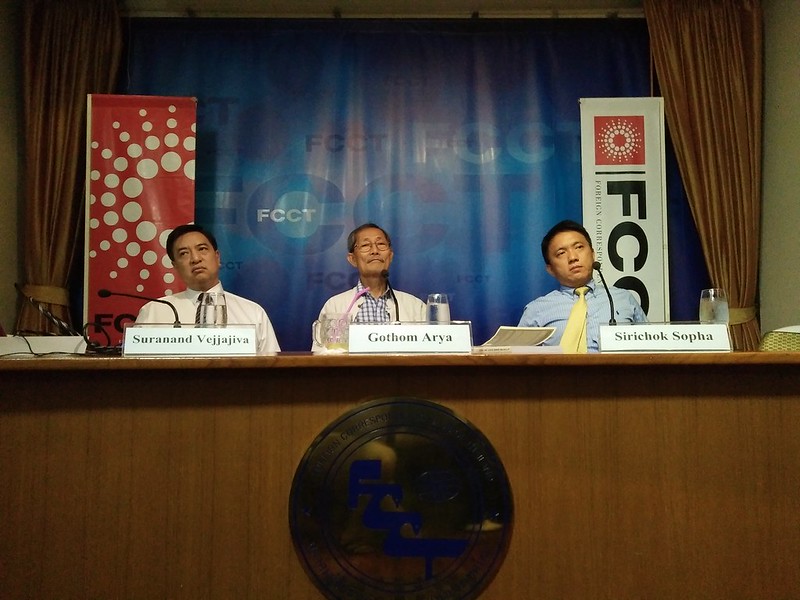Although the August referendum was held under an oppressive atmosphere, a politician from the main opposition party said the political parties are to be blamed for the results, adding that parties need reform to sway voters from authoritarianism.
At a public panel hosted by the Foreign Correspondents’ Clubs of Thailand (FCCT) on Friday, 12 August 2016, Suranand Vejjajiva argued that, in the leadup to the referendum, political parties critiqued the junta-backed draft constitution but didn’t make clear what principles should actually underpin Thailand’s governance.
Suranand’s analysis of why voters approved a draft charter likely to constrain their own rights was informed by his experiences as a former minister under the Thaksin Shinawatra government from 2005-2006, and a secretary general to former Prime Minister Yingluck Shinawatra from 2012-2014.
In particular, Suranand criticised political parties for struggling to promote a model of governance more appealing than the status quo. That status quo refers to an authoritarian regime dominated by the ideal of ‘good’ people making decisions for the masses, and the image of a decisive leader.
Suranand Vejjajiva, Gothom Arya and Sirichok Sopha debating the future of political parties at the Foreign Correspondents' Club of Thailand.
“The Thai culture of democracy is not as deep rooted as the admiration for authoritarianism,” Suranand explained in a Bangkok Post article published three days earlier. “This is why those in democratic movements have underestimated Gen Prayut.”
While Suranand acknowledged the restrictions on freedom of speech and association that constrained mobilisation in the pre-referendum period, he has noted that the repressive actions of the junta should not distract from the mistakes of political parties.
Suranand concluded in a Bangkok Post article published three days earlier, “True, the strength of the politicians to speak up is limited by the barrel of a gun pointing to their heads, but at the same time, they have not been able to present an alternative way out for the country. Democracy without substance will not win the hearts of supporters.”
On the same panel, deputy secretary general of the Democrat Party’s Sirichok Sopha contrasted Suranand’s pessimism by arguing that the results of the referendum genuinely represented the Thai public’s aspirations. This was so even if few voters were fully informed of the draft charter’s articles.
Sirichok firmly stated, “Even if you [had] open debates and free discussion, I’m pretty positive people would still [have] voted to accept the constitution.”
“I don’t think people are disengaged from politics,’ Sirichok added. ‘I was quite surprised by the turnout [given] there was no active campaigning by political parties. Yet 59 per cent of people still came out to vote in the end.”
For Sirichok, even though the Democrat Party and its leader Abhisit Vejjajiva had campaigned against the draft charter, the majority vote in favour of the constitution amounts now to a democratic mandate to cooperate with the new document.
“I think in the end Thai people voted for peace and security, and they traded off democracy for that. We have to really respect the wishes of the Thai people.”
Yet Sirichok also critiqued the junta’s repressive measures as likely to challenge the ability of political parties to fulfil their role of informing and representing the interests of their supporters in the long term.
“We will have to think about reforming ourselves so we are more responsive to the Thai people’s needs. The problem is that it is illegal at the moment for political parties to have meetings and to have a quorum on an issue. We are trying to ask the military to legalise our meetings. There is nothing we can really do without these meetings.”
What united the panellists was the significance of the Constitutional Drafting Commission’s ongoing process of drafting 10 organic laws. These laws, in the words of Suranand, range from “a party law that may allow for interfering” to “cyber digital laws that would impose control rather than open up society for debate”.
The third panelist Gothom Arya, a member of Thailand’s first election commission, called for the drafts of the organic laws to be made public, particularly the second that pertains to the appointment process of senators. Sirichok argued that the 240 days allocated by the junta to the drafting of organic laws were excessive and were delaying elections unnecessarily.
Despite significant electoral reforms in the draft constitution, Arya concluded with a prediction that “The political game after the election that is supposed to take place in November 2017 will depend this time around very much on the two big parties: the Democrats and the Pheu Thai. The likely scenario is that one of the two parties — I don’t know which one — will get along well with other pro-military parties.”
Suranand too remains optimistic that Thailand’s political parties can eventually engage citizens in the democratic process.
“Over time people will realise that democracy affects their wallets and their economic opportunities. When we can get that support, we can work backwards and look to amending the constitution, hopefully without confrontation and violence.”

